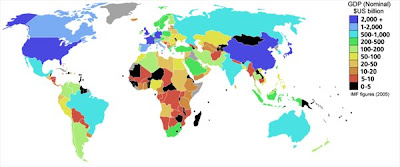 Connectivity to Major Cities
Connectivity to Major Cities Wealth concentration Year 1 CE, to 2015 CE.
Wealth concentration Year 1 CE, to 2015 CE.
World Economic Freedom
Sunday mornings are a chance to reflect on the week that was and give thought of the week ahead. This last week saw the passing of a second stimulus package of $787 billion that joins the previous outlay of $750 billion passed last October as the twin thumbs in our financial dike. This amounts to 1.5 trillion dollars or over 10% of our current Gross Domestic Product or 14 trillion dollars.
That is enough to make even the most die hard believer in government social spending pause and wish for something stronger than coffee. But coffee it must be to sober Americans up to facing a changing world.
The past several weeks I have been promoting Thomas Barnett's new book Great Powers: America and the World After Bush. Between it's covers Dr. Barnett charts out a course that he recommends America consider following in order to preserve the dominate role we have played in the past century and ensure that the source code of a free market economy, our DNA as Dr. Barnett labels it, continues to spread across the globe.
To begin collecting our thoughts about the course that Great Powers offers, it is helpful to read Barnett's column this week, where he defines America's role this way.
The United States has been the demand center in the global economy for so long that we can't remember when that wasn't true. And yet global corporations increasingly view us as just another market among many as the global middle class expands dramatically and rising India and China collectively compete with America's demand function.
Read more:
In the column you will note that Barnett lists our states by region and compares the economies of those member states with it's counterpart nation in the global economy. To take that line of thought and project it out consider this, in the coming decade our economy is projected to grow about 23% by 2014. The rest of the world's combined economy, GDP is projected to grow by 46% from 60 trillion to 87 trillion. Most of this growth will occur in the emerging nations that Tom Barnett labels the "New Core". Here is a brief list of the growth projected for a few of those nations.
2008-2014 projections
China, 114% 4.2 to 9.1 trillion, USD
.
India, 80% 1.2 to 2.2
Russia, 135% 1.6 to 3.9
Brazil, 75% 1.6 to 2.8
Mexico, 100% .9 to 1.8
.
List of 2008 forcast from the Economist.
Even countries emerging from decades of war like Vietnam and Cambodia are projected to see growth rate of 105% and 122% respective. The point I am making is that the connectivity that Dr. Barnett has so clearly outlined is something that like water will seek it's natural course and over time wear away the resistant rock that blocks its path.
.
As a nation that has for the past century emerged to do more to equalize the people of the world than any body of people in history, we are faced with two choices. One, withdraw, as was done by another "Great Power" the Chinese in 1435, when they abandoned their treasure fleets and sealed themselves off from the outside world believing that their way was secure by limiting contact and selling off their assets to the highest bidders through strictly controlled gateways. They ended this adventure cut off, stagnant, technologically far behind and easy pickings for the new "Great Powers" the Europeans and in part, the United States.
Or, we can stay engaged, renew our goals by remembering our past and the setting course with just as much self assurance as our ancestors. This has always been the legacy of the New World. Even those we named "Native Americans" took up that challenge thousands of years ago when they continued to advance across the land bridge and down the twin continents that make up this hemisphere. Our legacy is that sense of wanting to see what is over the next hill and then finding a way to improve what we find there to enhance our community. We Americans are a conglomeration of people who were not satisfied to stay behind and enjoy the status quo.
It seems our course is clear to let our natural instinct as Americans be our guide.



No comments:
Post a Comment